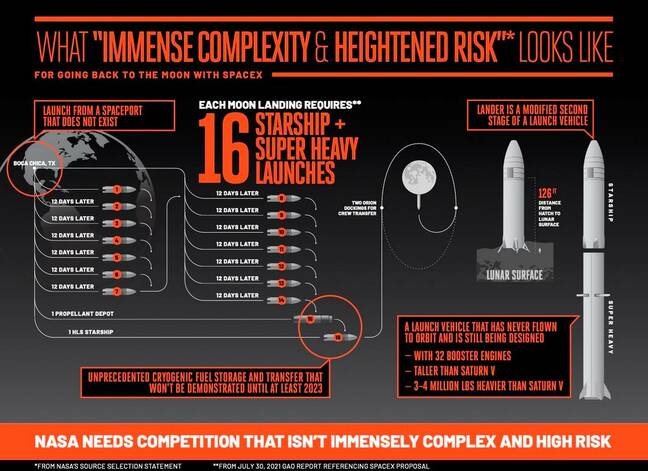This article is more than 1 year old
Blue Origin sues NASA for awarding SpaceX $3bn contract to land next American boots on the Moon
In Jeff's world, it's not 'you snooze, you lose', it's 'you lose, you sues'
Updated Blue Origin sued NASA late on Friday, claiming the space agency unfairly awarded top rival SpaceX a $2.94bn contract to develop the next lunar lander.
That lander will – fingers crossed – be part of NASA's flagship Artemis mission to put the first woman and next American man on the Moon. Three teams, including SpaceX and Blue Origin, submitted plans for the spacecraft. Ever since the contract was given to Elon Musk's SpaceX in April, Jeff Bezos's Blue Origin has fought tooth and nail to reverse NASA’s decision.
First, Blue Origin filed an official protest with the US Government Accountability Office. Dynetics, the third competitor for the contract, also filed a complaint. Bezos even wrote NASA an open letter offering a $2bn discount. But the Amazon supremo was snubbed, the auditors dismissed Blue Origin’s complaints, and earlier this month NASA was given the green light to continue working with SpaceX on the lander.
Unwilling to accept defeat, Blue Origin has now decided to take NASA to court to challenge the contract award. The lawsuit was, last time we checked, sealed.
“Blue Origin filed suit in the US Court of Federal Claims in an attempt to remedy the flaws in the acquisition process found in NASA’s Human Landing System,” a company spokesperson told The Register. “We firmly believe that the issues identified in this procurement and its outcomes must be addressed to restore fairness, create competition, and ensure a safe return to the Moon for America.”
- US govt calmly but firmly tells Blue Origin it already has a ride to the Moon's surface with SpaceX, thanks
- Bezos offers to knock $2bn off his bill to NASA to stay in the running for Moon contract
- SpaceX Starship struts its stack to show it has the right stuff
- Good news: Jeff Bezos went to space. Bad news: He's back
In Blue Origin’s complaint to the accountability office, the aerospace biz argued it was unfair to award the lander deal to one supplier at this early stage. At issue was the fact that NASA at one point promised to fund the development of multiple lander designs, and then pick one for the actual mission, whereas it ultimately decided to just go with SpaceX.
Kenneth Patton, the watchdog's managing associate general counsel for procurement law, said NASA didn’t violate procurement law or regulation in its winner-takes-all approach. Even if NASA wanted to award multiple companies, it couldn’t afford to do so, anyway, with its current budget.
The 76-page report from the accountability office stated that NASA only had $345m available for this fiscal year 2021 as a first installment payment to kickstart Artemis' Human Landing System project. NASA picked SpaceX because it was the cheapest option out of the three proposals. The space agency didn’t have much choice really, Patton argued.
Still, Blue Origin isn’t giving up on all those billions and the chance to build the space ferry to take the next future crew of American astronauts to the surface of the Moon. An infographic on its website claimed SpaceX’s Starship rocket was too complicated and risky to fly the future lunar lander.
Elon Musk hit back at the lawsuit, tweeting: “If lobbying and lawyers could get you to orbit, Bezos would be on Pluto right now.”
A spokesperson for NASA was not available for immediate comment. Lest anyone forget, Amazon went to court because Microsoft won the Pentagon's $10bn JEDI cloud contract ... and Microsoft protested Amazon winning an NSA IT deal. ®
Updated to add
The US space agency has got back to us regarding Friday's lawsuit.
"NASA was notified that Blue Origin filed a bid protest with the United States Court of Federal Claims following the denial of the protests filed with the U.S. Government Accountability Office regarding NASA’s selection for the human landing system Option A award. NASA officials are currently reviewing details of the case," a spokesperson told The Register.
"NASA is committed to the Artemis program and to maintaining the nation’s global leadership in space exploration. With our partners, we will go to the Moon and stay to enable science investigations, develop new technology, and create high paying jobs for the greater good and in preparation to send astronauts to Mars.
"As soon as possible, the agency will provide an update on the way forward for returning to the Moon as quickly and as safely as possible under Artemis."


